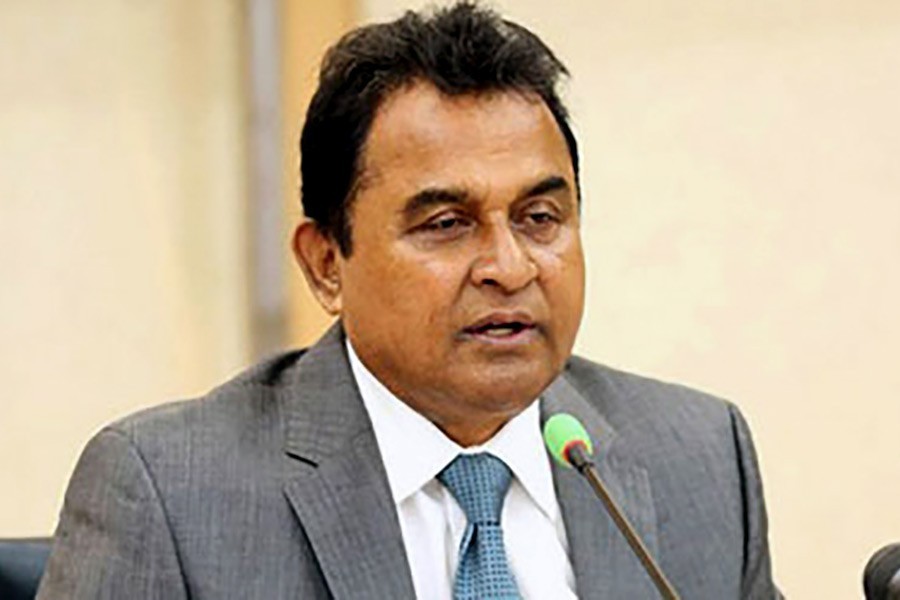
Published :
Updated :

Finance Minister AHM Mustafa Kamal has sought $1.0 billion budget support in the next fiscal year (FY21) in addition to $500 million budget support in current fiscal to overcome the shock of novel coronavirus (COVID-19).
He sought the support during a telephonic conversation with ADB President Masatsugu Asakawa on Monday, reports BSS quoting press release.
In order to face the adverse impact of this deadly virus on the country’s economy and also on society, the minister also sought extended project assistance, $100 million support for the frontline workers like health workers, civil administration, members of the law enforcement agencies and emergency services providers.
The finance minister sought $150 million from the Manila-based lending agency for generating employment for those local and expatriate Bangladeshi workers who lost their jobs due to COVID-19.
Bangladesh also sought support to rehabilitate the micro, small, medium and cottage industry entrepreneurs. Kamal also requested the ADB president to reduce commitment charge on OCR loans given by the ADB.
Kamal said, “Coronavirus has started to put impact on our imports and exports while most of our expatriate Bangladeshis have become jobless due to this pandemic. As a result, the inward remittance flow has come to a stagnant stage and to face such crisis moment, we seek continued support and assistance from the ADB.”
Extending thanks to the ADB president for announcing a $20 billion financial package for supporting the member countries to overcome the impact of COVID-19, the finance minister also hoped that with the support from the ADB, the member developing countries would be able to overcome the adverse impact of this deadly virus.
The finance minister also thanked the ADB for announcing $602.39 million immediate support to Bangladesh for tackling this virus.
Kamal said the shock of the global economic recession has also become a matter of concern for the economy of Bangladesh. “We don’t know for how long this crisis will persist and to what extent it will impact our economy. Despite this, we’re working to face the possible negative impact of this virus on our economy,” he said.
In response, the ADB president told the finance minister that he had taken note of the issue of providing financial assistance to Bangladesh and would inform the government of Bangladesh later after reviewing the proposals.
Kamal apprised the ADB President about the steps undertaken by Bangladesh to prevent and control COVID-19.
He said that the government has enforced general holidays till April 25, suspending all kinds of operations, including the industries and businesses, except the emergency services while the mass transportation system has also remained shut.
He told the ADB president even the government cancelled the birth celebration programmes of Father of the Nation Bangabandhu Sheikh Mujibur Rahman as well as the programmes marking the Independence Day and Pohela Baishakh to avert the spread of COVID-19.
The finance minister mentioned that Prime Minister Sheikh Hasina had announced stimulus packages of Taka 956.19 billion, which is 3.3 per cent of GDP, to offset the adverse impact of the coronavirus on various sectors.
The ADB president lauded the Prime Minister for announcing such huge amount of stimulus packages in the wake of COVID-19 as well as various steps of the government to face this crisis.
He observed that the coronavirus pandemic could unleash a major assault on the advancement of the Asian and Pacific region on their economic, social and development fronts resulting in the escalation of poverty and economic recession.
The ADB present requested the finance minister to speedily complete the ongoing ADB supported projects as well as process fast those projects which are in the pipeline.
Currently, there are some 63 projects with an overall ADB support of $8.70 billion while there are also 81 projects in the pipeline with a committed ADB support of $9.94 billion.
The ADB has so far provided 25.14 billion to Bangladesh in its power, energy, local government, transport, education, agriculture, water resources, good governance and financial sectors.


 For all latest news, follow The Financial Express Google News channel.
For all latest news, follow The Financial Express Google News channel.